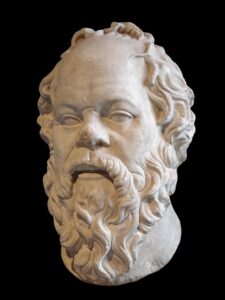
Ho’oponopono: The Harmony Between Potentiality and Reality
The ancient Hawaiian practice of Ho’oponopono, as refined and taught by Morrnah Nalamaku Simeona and Dr. Ihaleakala Hew Len, is an intriguing journey towards self-realization and self-healing. This journey mirrors the existential undercurrent that permeates Socratic philosophy and the tales of Genesis, emphasizing the human capacity to transform potentiality into reality through conscious choices and ethical decisions.

The Ho’oponopono psyche is not dissimilar from the Socratic view of life and death. Just as Socrates’ life suggested that a well-lived existence could lead to a graceful acceptance of death and a sense of satisfaction, Ho’oponopono teaches us that by addressing our inner conflicts, reconciling with our past, and liberating ourselves from burdensome memories, we create a well-lived present that promotes a sense of inner peace and satisfaction.
There is a potent correlation between Ho’oponopono and psychological studies that highlight human tendencies to regret missed opportunities more than mistakes or sins of commission. Ho’oponopono, at its core, is about recognizing and seizing the opportunity to heal oneself, to mend relationships, and to cultivate inner peace. By acknowledging our mistakes and actively seeking resolution, we avoid the regret of missed opportunities for self-growth and healing.
In Ho’oponopono, consciousness plays a pivotal role. It aligns with the philosophical belief that human consciousness is the faculty that confronts potential and encounters the unknown. Consciousness, according to Ho’oponopono, is the catalyst that allows us to transform the future into the present, shaping our actuality through our thoughts, beliefs, and feelings. Just as consciousness in this context enables us to make choices that shape our reality, Ho’oponopono champions the idea of personal responsibility in healing and transformation.
This concept of transforming potentiality into reality has been emphasized in many ancient religious stories, including those found in Genesis. In this biblical account, God is described as the entity that brings order out of chaos and generates the world from formless potential. Ho’oponopono echoes this sentiment, encouraging individuals to bring order to their inner world, transforming their emotional and psychological chaos into peace, balance, and well-being.
The belief that humans are made in God’s image and are thus called to act in relationship to the potential that confronts them, with truth, courage, and careful articulation, resonates strongly with Ho’oponopono practice. Practitioners of Ho’oponopono view themselves as co-creators of their reality, invoking the divine aspect within them to cleanse their memories and perceptions and to create a reality that is in harmony with the divine. This act of creation allows them to bring forth what is good in their lives and in their relationships, resonating with the principles of truth, courage, and careful articulation.
Thus, Ho’oponopono, in its gentle, unassuming manner, subtly promotes an ideology that encompasses profound philosophical and psychological truths. It provides a practical approach to deal with life’s complexities and challenges, enabling individuals to transform their potential for peace and healing into a tangible reality. The journey of Ho’oponopono is one of self-discovery and transformation, where conscious choices, personal responsibility, and divine connection converge, fostering an environment conducive to growth, healing, and the actualization of our best selves.


You May Also Like

How To Clean For 24 hours Every Day

The Ripple Effect of Responsibility: A Ho’oponopono Approach to Life’s Pleasures and Challenges.
